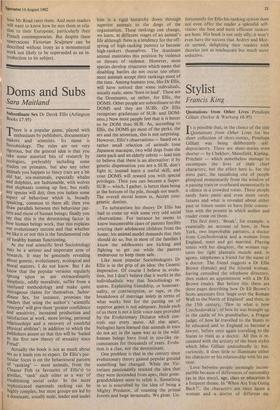Doms and Subs
Sara Maitland
There is a popular game, played with enthusiasm by publishers, documentary Makers and scientists. Its name is Sociobiology. The rules are not very rigorous, but the general idea is that you take some assorted bits of research by zoologists, preferably including some studies on primates, but also any other animals you happen to fancy (rats are a bit old hat, sea-mammals, especially whales and dolphins, are fashionable, with wolves and elephants coming up fast, but really any species will do); then you isolate some aspect of behaviour which is, broadly speaking, common to them all; then you draw parallels between this behaviour pat- tern and those of human beings; finally you say that this is the determining factor in how human beings work, that this explains our evolutionary success and that whether We like it or not this is the fundamental rule of healthy human functioning.
At the real scientific level Sociobiology may be a serious and important area of research. It may be genuinely revealing about genetic, evolutionary, ecological and moral matters. I do not know. But I do know that the popular versions regularly sprung upon us are extraordinarily simplistic, oddly moralistic, suffer from a Confused methodology and make quite outrageous claims for themselves. Subor- dinate Sex, for instance, promises the readers that using the author's 'scientific Concepts' will give them 'greater confidence and sensitivity, increased production and satisfaction at work, more loving, personal relationships and a recovery of youthful Physical abilities'; in addition to which the Publishers assure us that this will be 'hailed as the first new theory of sexuality since Freud'.
Actually the book is not as much about sex as it leads you to expect. Dr Ellis's par- ticular focus is on the behavioural pattern of 'ranking' — most animals, from the Cleaner Fish (a favourite of Ellis's) to gorillas, 'rank' each other as a way of establishing social order. In the more sophisticated mammals ranking can be highly complex, but most groups are led by a dominant, usually male, leader and under him is • a rigid hierarchy down through superior animals to the dregs of the organisation. These rankings can change, we learn, at different stages of an animal's life although there is a tendency for the off- spring of high-ranking parents to become high-rankers themselves. The dominant animal maintains this position by violence or threats of • violence. However, most species develop structures which mean that disabling battles do not occur too often: most animals accept their rankings most of the time. Among humans you, like Dr Ellis, will have noticed that some individuals, usually male, seem 'born to lead'. These are the Dominants, or rather, for Ellis, the DOMS. Other people are subordinate to the DOMS and they are SUBS. (Dr Ellis recognises gradations of SUB- and DOM- ness.) Now most people feel that it is better to be DOM than SUB. As, according to Ellis, the DOMS get most of the perks, the sex and the attention, this is not surprising. However, Ellis's observations — based on a rather small selection of animals (one Japanese macaque, two wild dogs from the same pack and an elderly zebra) — lead him to believe that there is an alternative: if by genetic dispensation you are a SUB, don't fight it; instead learn a useful skill, and your DOMS will reward you with special privileges. Then you can become a Super- SUB — which, I gather, is better than being at the bottom of the pile, though not much. The overall moral lesson is, Accept your genetic destiny.
To substantiate his theory Dr Ellis has had to come up with some very odd social observations. For instance he seems to know innumerable cases of parents forcibly evicting their adolescent children from the home; his animal model demands that they should do so, but in most of the families I know the adolescents are kicking and fighting to get out while the parents endeavour to keep them safe.
Like most popular Sociobiologists Dr Ellis is in the grip of an idea: the Genetic Imperative. Of course I believe in evolu- tion, but I don't believe that it works in the individualistic way that Sociobiology re- quires. Explaining friendship, or homosex- uality, or contraception, or rape, or the breakdown of marriage solely in terms of what works best for the passing on of superior genes is not adequate. Inside each of us there is not a little voice-tape provided by the Evolutionary Dictator which con- trols our every move. All else apart, biologists have learned that animals in zoos do not act in the same way as in the wild: human beings have lived in zoo-like cir- cumstances for thousands of years. Evolu- tion is a clue, not the determinant.
One problem is that in the century since evolutionary theory gained popular ground something has changed. While the Vic- torians passionately resisted the idea that they were descended from apes, their great- grandchildren seem to relish it. Something in us is nourished by the idea of being a Mighty Predator, of roaming the primal forests and huge savannahs. We gloat. Un-
fortunately for Ellis his ranking system does riot even offer the reader a splendid self- vision: the best and most efficient rankers are hens. His book is not only silly; it won't even have the success that Ardrey and Mor- ris earned, delighting their readers with theories just as inadequate but much more seductive.


































 Previous page
Previous page